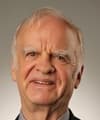South Shore Charter School opens, giving parents another option and adding fuel to a debate
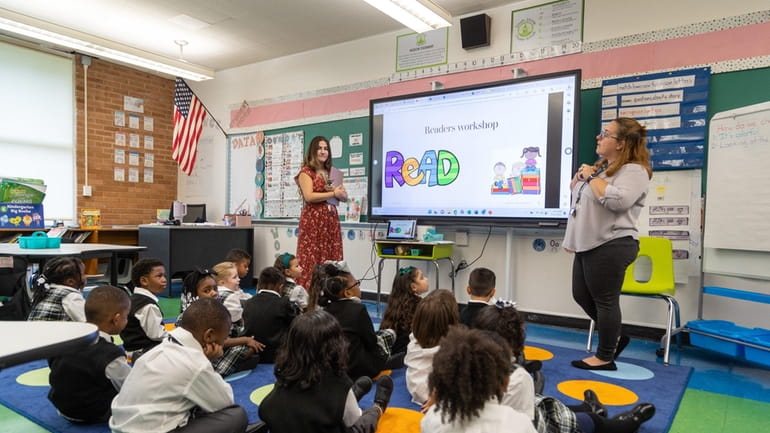
Kelsey Alpert, left, and Gina Martinez work with their kindergarten class at the South Shore Charter School in Ronkonkoma. "I'm looking forward to shaping those little minds and watching them grow," Martinez said. Credit: Barry Sloan
Long Island's newest public charter school is open and operating on an extended-day schedule, though its ultimate location remains a question mark and a point of frustration for some district officials.
This year's opening of South Shore Charter School in central Suffolk County brings to seven the number of independent charter campuses in Nassau and Suffolk. Growth of the region's charter movement has produced schooling choices welcomed by many parents, but also complaints from educators that it is diverting funds needed by traditional public schools.
A case in point is an ongoing dispute over South Shore's location. The school originally was authorized to operate in Central Islip under a decision reached last year by trustees of the State University of New York. SUNY trustees and the state's Board of Regents are the two New York authorities with power to approve charter schools.
As a temporary measure, South Shore requested state permission to locate in a vacant parochial school in Ronkonkoma, located within the Sachem school district and a few miles east of Central Islip. SUNY held public hearings on the issue and is giving the school two years' time to acquire a suitable permanent site in Central Islip, according to a spokesman, Michael Lesczinski.
Dermoth Mattison, the school's founder and executive director, said a move is planned for next fall and that his organization saw an urgent need to help students recover from learning losses experienced during the COVID-19 pandemic.
"South Shore Charter School was founded out of a need that existed in this region," Mattison said at school last week. "What we realize is that parents want a choice. They want assurance that the learning gap will be closed."
Mattison formerly served six years as a principal at Academy Charter School in Hempstead, which ranks among the highest-scoring charter campuses in the state.
Sachem's superintendent, Christopher Pellettieri, voiced frustration over the situation.
Pellettieri said 23 students from the district enrolled at South Shore, and that this will cost the district about $500,0000 this school year in tuition charges, busing, special education and other costs. Under state law, charter schools receive funding from districts depending on how many students they attract from those systems.
"This is not supposed to happen — the school is not supposed to be here," Pellettieri said. "I'm all for children being educated, so I don't hold ill will or anything. But at the end of the day, it's supposed to be somewhere else."
South Shore started classes Sept. 6 with an initial enrollment of 151 kindergartners and first-graders, mostly from Central Islip. State rules authorize the school to expand its numbers to a maximum 450 students in grades K-5 over the next five years.
Like many charter schools, South Shore operates on an all-day schedule, opening each morning at 7:45 and continuing until 4 p.m. A typical class schedule includes breakfast, lunch and two snacks, along with a "morning circle" meeting where students learn social skills and conflict resolution.
Still, there is an emphasis on academics, with extended sessions in reading and math, together with regular periods of physical education, art, music and science.
Last Monday, two kindergarten teachers, Kelsey Alpert and Gina Martinez, were passing along tips to their students, all dressed in uniforms accented in plaid, on how to select a reading book. Martinez, who formerly taught preschool classes, said she was looking forward to this year's new experience.
"For me, it's going to be very rewarding," she said. "I'm looking forward to shaping those little minds and watching them grow."
One special feature of South Shore's curriculum is pre-engineering training offered through a national program called "Project Lead the Way." Portions of the program are available even to the youngest students — for example, in the form of wooden balls rolled down a miniature ramp as children learn basic principles of physics.
Like other schools, South Shore will administer state testing assessment in English, math and other subjects as students move into higher grade levels. School administrators here said they rely on personal observation as well as test results to make sure students stay on track academically.
Principal Arsenio Heslop was in a first-grade classroom last week, checking on 6-year-olds' progress and providing what he described as "in-the-moment feedback" to teachers.
"We're not waiting for the assessments to come back," Heslop said.
A parent, Kymberly May, said she already noticed an increase in her 6-year-old daughter's independent reading after the first week of classes. May, a senior tech nursing attendant who lives in the Sachem district, added that her daughter's attitude convinced her that the first-grader should remain enrolled at South Shore when the school relocates to Central Islip.
"She's excited, she's happy," the mother said.
Elsewhere on the Island, two charter schools operate in Hempstead, with others located in Riverhead, Roosevelt, Uniondale and Wyandanch. Another charter school, Child Development Center of the Hamptons, opened in Wainscott in 2000 but closed later after enrollments declined.
Proportionately, charter enrollments represent a small share of the public school population on Long Island — about 5,400 students overall, or a little over 1% of the total. However, in certain communities with concentrations of charter students — notably, Hempstead — such schools can have a major impact.
Generally, any families living within districts where charter schools are located are given priority in enrollment of their children. Admission is usually by lottery when applications exceed available classroom slots.
Supporters of the charter movement note that their schools provide a free academic alternative for parents in low-income communities who may not be able to afford private education for their children. Two scholastic successes often cited are schools in Hempstead and Uniondale run by the Academy charter organization.
In 2022, for example, 54% of students in grades 3-8 at the Academy school in Hempstead scored "proficient" on New York's math tests, according to state records. At the Uniondale school, the figure was 51%. In both cases, results were at least 10 points higher than regional averages for all public schools, at a time when math scores generally fell due to effects of the COVID-19 pandemic.
Nicholas Stapleton, chief academic officer for the Academy Charter group, credited extended learning time for much of the schools' success. He said schools run on eight-hour daily schedules during the regular school year and provide additional instruction during summer sessions of four to six weeks.
"We found that by putting in the work, making an effort, our scholars still performed well," said a colleague, Felicia Barracks, the charter group's chief of staff.
Representatives of affected districts said they respected the right of parents to choose their children's schools but felt their own systems had much to offer. Sharon Dungee, who is Central Islip's superintendent, noted that her district provides extended school days for students in need of extra instruction, as well Saturday sessions and summer enrichment activities that include cooking, singing and crafts.
"The 'public education' afforded to its students embraces diversity as a strength," Dungee said in a statement.
Monique Darrisaw-Akil, the Uniondale superintendent, said her district faced about $20 million in charter-school tuition fees and other costs this school year.
In Hempstead, school board president LaMont Johnson said his district was projecting charter-school tuition charges of $75.5 million this school year, together with $1.38 million in busing expenses. Johnson noted that his district was raising graduation rates, adding classrooms and improving sports facilities in an effort to retain students.
"I'm not against charter schools, but I am against the way they're funded," said Johnson, who favors a shift in the state's financial approach. "It's hurting our ability to help students."
Long Island's newest public charter school is open and operating on an extended-day schedule, though its ultimate location remains a question mark and a point of frustration for some district officials.
This year's opening of South Shore Charter School in central Suffolk County brings to seven the number of independent charter campuses in Nassau and Suffolk. Growth of the region's charter movement has produced schooling choices welcomed by many parents, but also complaints from educators that it is diverting funds needed by traditional public schools.
A case in point is an ongoing dispute over South Shore's location. The school originally was authorized to operate in Central Islip under a decision reached last year by trustees of the State University of New York. SUNY trustees and the state's Board of Regents are the two New York authorities with power to approve charter schools.
As a temporary measure, South Shore requested state permission to locate in a vacant parochial school in Ronkonkoma, located within the Sachem school district and a few miles east of Central Islip. SUNY held public hearings on the issue and is giving the school two years' time to acquire a suitable permanent site in Central Islip, according to a spokesman, Michael Lesczinski.
WHAT TO KNOW
- Long Island's seventh public charter school opened this year, providing services welcomed by many parents, but also igniting a debate over its location.
- South Shore Charter School occupies temporary rental space in the Sachem school district, rather than in the Central Islip district where its work is to be concentrated. The move was approved by SUNY officials, who have given the school two years to find permanent quarters.
- Sachem administrators say the school's choice of location will cost them $500,000 this year in student tuition charges and other costs, echoing complaints by other districts that charter schools divert funds from the traditional public sector.
Dermoth Mattison, the school's founder and executive director, said a move is planned for next fall and that his organization saw an urgent need to help students recover from learning losses experienced during the COVID-19 pandemic.
"South Shore Charter School was founded out of a need that existed in this region," Mattison said at school last week. "What we realize is that parents want a choice. They want assurance that the learning gap will be closed."
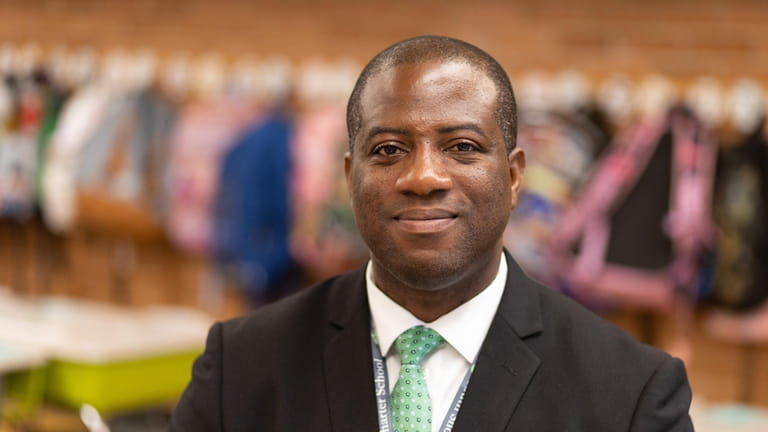
Dermoth Mattison is the founder and executive director of South Shore Charter School. Credit: Barry Sloan
Mattison formerly served six years as a principal at Academy Charter School in Hempstead, which ranks among the highest-scoring charter campuses in the state.
Sachem's superintendent, Christopher Pellettieri, voiced frustration over the situation.
Pellettieri said 23 students from the district enrolled at South Shore, and that this will cost the district about $500,0000 this school year in tuition charges, busing, special education and other costs. Under state law, charter schools receive funding from districts depending on how many students they attract from those systems.
"This is not supposed to happen — the school is not supposed to be here," Pellettieri said. "I'm all for children being educated, so I don't hold ill will or anything. But at the end of the day, it's supposed to be somewhere else."
Extended sessions in reading, math
South Shore started classes Sept. 6 with an initial enrollment of 151 kindergartners and first-graders, mostly from Central Islip. State rules authorize the school to expand its numbers to a maximum 450 students in grades K-5 over the next five years.
Like many charter schools, South Shore operates on an all-day schedule, opening each morning at 7:45 and continuing until 4 p.m. A typical class schedule includes breakfast, lunch and two snacks, along with a "morning circle" meeting where students learn social skills and conflict resolution.
Still, there is an emphasis on academics, with extended sessions in reading and math, together with regular periods of physical education, art, music and science.
Last Monday, two kindergarten teachers, Kelsey Alpert and Gina Martinez, were passing along tips to their students, all dressed in uniforms accented in plaid, on how to select a reading book. Martinez, who formerly taught preschool classes, said she was looking forward to this year's new experience.
"For me, it's going to be very rewarding," she said. "I'm looking forward to shaping those little minds and watching them grow."
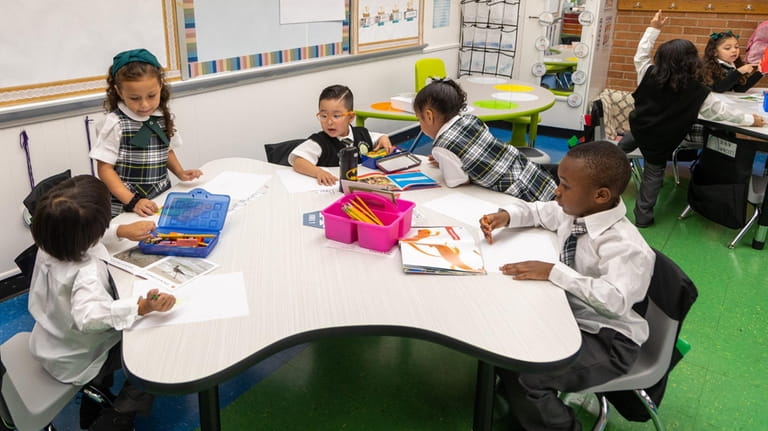
Kindergartners get to work in a charter school class co-taught by Kelsey Alpert and Gina Martinez. Credit: Barry Sloan
One special feature of South Shore's curriculum is pre-engineering training offered through a national program called "Project Lead the Way." Portions of the program are available even to the youngest students — for example, in the form of wooden balls rolled down a miniature ramp as children learn basic principles of physics.
Like other schools, South Shore will administer state testing assessment in English, math and other subjects as students move into higher grade levels. School administrators here said they rely on personal observation as well as test results to make sure students stay on track academically.
Principal Arsenio Heslop was in a first-grade classroom last week, checking on 6-year-olds' progress and providing what he described as "in-the-moment feedback" to teachers.
"We're not waiting for the assessments to come back," Heslop said.
A parent, Kymberly May, said she already noticed an increase in her 6-year-old daughter's independent reading after the first week of classes. May, a senior tech nursing attendant who lives in the Sachem district, added that her daughter's attitude convinced her that the first-grader should remain enrolled at South Shore when the school relocates to Central Islip.
"She's excited, she's happy," the mother said.
Small share of students overall
Elsewhere on the Island, two charter schools operate in Hempstead, with others located in Riverhead, Roosevelt, Uniondale and Wyandanch. Another charter school, Child Development Center of the Hamptons, opened in Wainscott in 2000 but closed later after enrollments declined.
Proportionately, charter enrollments represent a small share of the public school population on Long Island — about 5,400 students overall, or a little over 1% of the total. However, in certain communities with concentrations of charter students — notably, Hempstead — such schools can have a major impact.
Generally, any families living within districts where charter schools are located are given priority in enrollment of their children. Admission is usually by lottery when applications exceed available classroom slots.
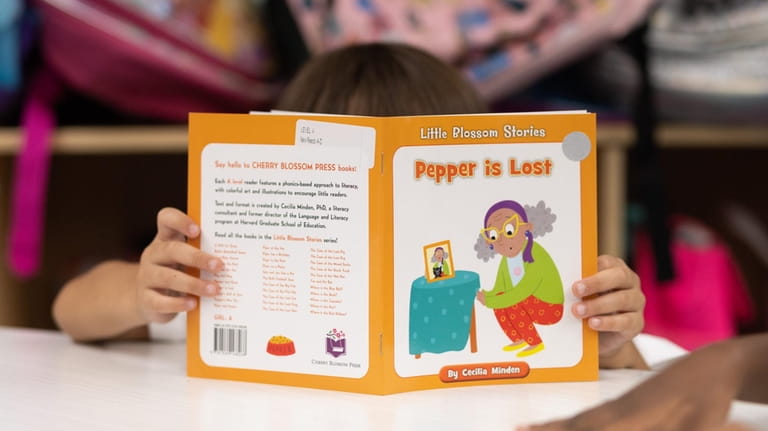
Eden Palomino, 5, reads a book in his kindergarten class at South Shore Charter School. Credit: Barry Sloan
Supporters of the charter movement note that their schools provide a free academic alternative for parents in low-income communities who may not be able to afford private education for their children. Two scholastic successes often cited are schools in Hempstead and Uniondale run by the Academy charter organization.
In 2022, for example, 54% of students in grades 3-8 at the Academy school in Hempstead scored "proficient" on New York's math tests, according to state records. At the Uniondale school, the figure was 51%. In both cases, results were at least 10 points higher than regional averages for all public schools, at a time when math scores generally fell due to effects of the COVID-19 pandemic.
Nicholas Stapleton, chief academic officer for the Academy Charter group, credited extended learning time for much of the schools' success. He said schools run on eight-hour daily schedules during the regular school year and provide additional instruction during summer sessions of four to six weeks.
"We found that by putting in the work, making an effort, our scholars still performed well," said a colleague, Felicia Barracks, the charter group's chief of staff.
Districts defend performance
Representatives of affected districts said they respected the right of parents to choose their children's schools but felt their own systems had much to offer. Sharon Dungee, who is Central Islip's superintendent, noted that her district provides extended school days for students in need of extra instruction, as well Saturday sessions and summer enrichment activities that include cooking, singing and crafts.
"The 'public education' afforded to its students embraces diversity as a strength," Dungee said in a statement.
Monique Darrisaw-Akil, the Uniondale superintendent, said her district faced about $20 million in charter-school tuition fees and other costs this school year.
In Hempstead, school board president LaMont Johnson said his district was projecting charter-school tuition charges of $75.5 million this school year, together with $1.38 million in busing expenses. Johnson noted that his district was raising graduation rates, adding classrooms and improving sports facilities in an effort to retain students.
"I'm not against charter schools, but I am against the way they're funded," said Johnson, who favors a shift in the state's financial approach. "It's hurting our ability to help students."
PUBLIC CHARTER SCHOOLS ON LONG ISLAND
Academy Charter School, Hempstead
Academy Charter School 2, Wyandanch
Academy Charter School-Uniondale, Uniondale
Evergreen Charter School, Hempstead
Riverhead Charter School, Riverhead
Roosevelt Children's Academy Charter School, Roosevelt
South Shore Charter School, Central Islip*
* Temporarily in Ronkonkoma
SOURCE: State Education Department
